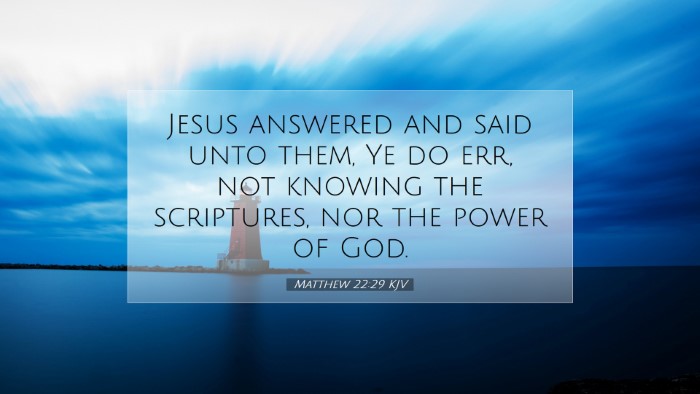Commentary on Matthew 22:29
Bible Verse: "But Jesus answered and said to them, 'You are mistaken, not knowing the Scriptures nor the power of God.'" (Matthew 22:29, NKJV)
Introduction
This verse occurs in the context of a question posed by the Sadducees, a sect within Judaism that denied resurrection and embraced a literal interpretation of the Torah. In responding, Jesus exposes their ignorance of both the Scriptures and the divine power of God, which is foundational for understanding the concepts of life, death, and resurrection. This commentary amalgamates insights from prominent public domain sources, including Matthew Henry, Albert Barnes, and Adam Clarke, aiming to provide depth for pastors, students, theologians, and Bible scholars.
Understanding the Context
The Sadducees confronted Jesus with a hypothetical scenario regarding the resurrection. Their query aimed to undermine the belief in life after death by presenting a complex situation about leverite marriage and the resurrection. Matthew Henry emphasizes that the nature of their question reflects a superficial engagement with spiritual truths. They sought to entangle Jesus with their logic, yet they were themselves entangled by their limited understanding.
Exegesis of the Verse
- Ignorance of the Scriptures: Jesus highlights that the Sadducees do not truly "know the Scriptures." Albert Barnes states that ignorance of the Scriptures leads to misconceptions about God's nature and His promises concerning life beyond death. Their limited understanding of Scripture's teachings on resurrection indicates a broader disregard for biblical authority.
- Understanding God's Power: The second part of Jesus' response references "the power of God." Adam Clarke explicates this by asserting that a true comprehension of God's omnipotence and sovereignty is essential in grasping the reality of resurrection. God’s power is capable of bringing life from death, transcending human logic and understanding.
- Application of Knowledge: Matthew Henry reflects on the vital connection between knowledge and faith. Knowing the Scriptures correctly forms the basis of a believer’s faith and understanding of God’s plans. A flawed understanding, as evidenced by the Sadducees, leads to confusion about core theological tenets.
Theological Implications
This passage serves as a significant reminder of the necessity of rigorous biblical study. Pastors and theologians are called to combat ignorance and misconceptions with sound doctrine, reflecting the importance of a well-rounded theological education.
Furthermore, this encounter signifies that knowledge must be wedded to the recognition of God’s power. The resurrection is not merely a doctrinal statement but a powerful reality affirmed by divine capability. The Sadducees' error illustrates how lack of faith in divine power can lead to serious theological missteps.
Lessons for Modern Believers
- The Importance of Scripture: Believers today are encouraged to engage deeply with Scripture, as it reveals God's character, intentions, and eternal truths. Ignorance can lead to spiritual deception and doubt.
- Recognizing Divine Power: The omnipotent nature of God should shape our understanding of life's challenges and the hope of resurrection. Believers are urged to grow in faith, understanding that God's power can transform circumstances beyond human reasoning.
- Engagement with Cultural Questions: Like the Sadducees' challenge, modern believers face cultural dilemmas that test scriptural truths. A robust theological grounding, as Jesus demonstrated, equips believers to respond to challenges effectively.
Conclusion
Matthew 22:29 encapsulates a profound theological clash that speaks to the heart of faith. By addressing the Sadducees' ignorance, Jesus highlights the necessity of understanding the Scriptures and the power of God. As contemporary believers strive to strengthen their faith, this verse calls for a return to Scriptural literacy and a recognition of God's boundless capabilities. Engaging with this passage allows for a deeper appreciation of resurrection’s significance—both as a doctrine and a transformative reality within the Christian faith.


